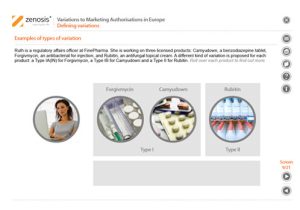Variations to Marketing Authorisations in Europe
Course Summary
Changes to the terms of marketing authorisations for medicinal products, called variations in Europe, must be notified to or approved by the relevant regulatory authorities. Variations include changes to the composition of products, their manufacturing processes, the way they are used, or the indications for which they are authorised. Common approaches are adopted within the European Economic Area to variations to marketing authorisations approved through the Centralised, Decentralised or Mutual Recognition Procedures or through purely national procedures. Recent legislation has substantially modified the regulatory requirements for products for human use. This module, which is fully up to date with the amended law and regulatory guidance, covers the classification of variations into their several types and describes the regulatory requirements, guidance and procedures to be followed for each type.

£99.00 Original price was: £99.00.£79.00Current price is: £79.00. exc. VAT
Purchasing Information
When you have completed your course order, Zenosis will finalise the setup of your course materials and contact you on the email address that you provide in your order. You can expect this process to be completed within one business day (using the UK business calendar) of completing your payment.
It is therefore essential that you use your real email address for your order, or indicate in the purchase notes the email address to be used for the course set-up, and check that any messages from Zenosis or grapl are not lost in your junk or spam folder.
You will have access to the course module(s) for a period of 180 days after your purchase is complete.
Detailed Course Information
• Define the concept of variations to marketing authorisations in the EEA.
• Identify which type of variation is appropriate for each kind of change to be made.
• Identify the documentation required to support the variation.
• Describe how to prepare and submit variation notifications or applications appropriate for each type of variation and route of regulatory approval, including options for grouping of variations and for work sharing of assessment.
Regulatory affairs and compliance staff, and all those who contribute to regulatory submissions, will find this course invaluable as training and/or a useful reference tool.
• Course overview
– This short session sets out the scope and learning objectives of the course and identifies important changes to European Union variations law implemented in 2025.
• Defining variations
– This session identifies and characterises the different types of variation.
• Determining variation types
– This session looks at the reasons for variations and describes how to identify the type of variation appropriate for each change required.
• General procedural aspects
– This session describes the different routes to regulatory approval of variations, identifies which is appropriate for a given product, specifies the supporting documentation necessary, and describes the provisions for grouping multiple variations into a single submission and for work sharing of regulatory assessment among member states.
• Variations via the Centralised Procedure
– This session describes the processes specific to the submission and processing of variations notifications and applications through the Centralised Procedure.
• Variations via the Mutual Recognition Procedure
– This session describes the processes specific to the submission and processing of variations notifications and applications through the Mutual Recognition Procedure or purely national procedures.
• Case study
– A case study of a flawed submission process.
• Assessment
– Multiple-choice mastery assessment.
